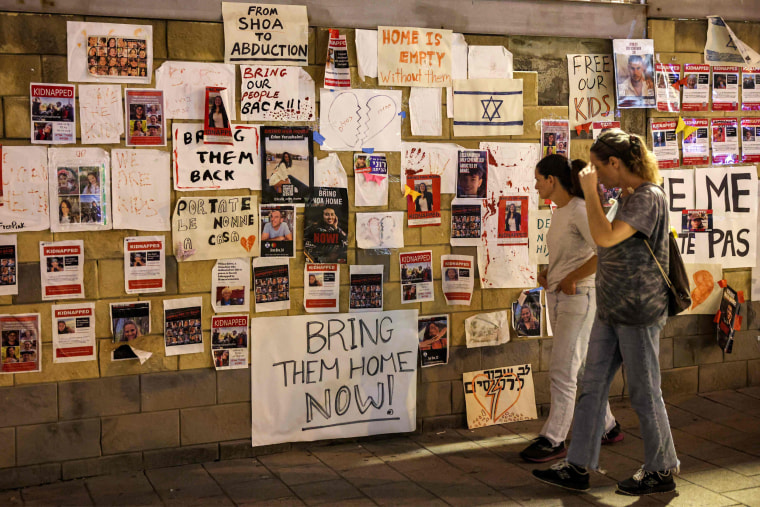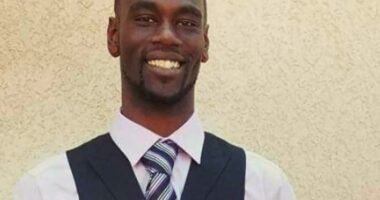TEL AVIV — For most world leaders, the simultaneous crises encircling Israeli Prime Minister Benjamin Netanyahu would feel like the walls closing in. But “Bibi,” a political Houdini who has survived numerous political predicaments, has many wondering if he has more trick left up his sleeve.
He has been notably absent from public view in the nearly three weeks since the Oct. 7 Hamas terrorist attacks, with the Netanyahu-shaped hole made even more apparent by his military chiefs giving daily news conferences. Meanwhile, he has been condemned by some families of the roughly 220 hostages, and even close ally the United States has called for what it calls a pause in the bombing of Gaza amid a mounting civilian death toll. Finally, polling suggests most Israelis think he should resign.
“Netanyahu wasn’t particularly popular before Oct. 7, and is now widely unpopular, including among his own supporters,” said Michael A. Horowitz, a Jerusalem-based analyst who is the head of intelligence at Le Beck International, a risk-management consultancy focused on the Middle East.
“But,” Horowitz adds, “he has also been called dead, politically, more than once, and still came back, in the purest tradition of the promised land.”

In a warning to anyone writing off Netanyahu just yet, Horowitz describes him as “Israel’s real-life Frank Underwood,” the ruthless “House of Cards” protagonist who rides countless crises to stay in power.
Netanyahu was already facing spiraling setbacks before what many consider the worst day in Israel’s history.
He is on trial for an array of charges including bribery, fraud and breach of trust, which he denies. After the latest in a series of elections and collapsed coalitions, his most recent Cabinet features a cast of ultranationalist and ultrareligious firebrands and is the most hard-right government in Israel’s history. He has also faced some of the biggest protests in Israeli history over judicial reforms that critics say would concentrate too much power in the government’s hands.
While atrocities such as the Hamas attacks sometimes produce a rally-round-the-flag effect for those in power, there has been no such boon for Netanyahu.
A poll conducted days after the attack found almost all respondents, 94%, believe the government must share some of the blame for Hamas’ unprecedented land, sea and air assault on Israel, killing around 1,400 people. Some 86% said the attack was a failure of the country’s leadership, and 56% said Netanyahu must resign after the war.
A string of top Israeli officials have accepted responsibility, from the head of the Shin Bet security agency, Ronen Bar, to former Prime Minister Naftali Bennett, who wasn’t even in power at the time but still said he was partly to blame for the litany of failures that allowed more than 1,000 terrorists to break out of Gaza and attack civilians for hours.
But so far Netanyahu has not acknowledged any failings.
On Wednesday, he promised in a nationwide address that the attacks “will be fully investigated” but did not accept responsibility.
“Everyone will have to give answers, me, too,” he said. “But all this will happen only after the war.”

For critics of the prime minister, this all aligns with their charge that Netanyahu is more interested in his own political survival than stewarding his country out of trouble.
“Netanyahu is seen as working towards his political survival, rather than engaging effectively with the distressed public and taking responsibility,” according to Nimrod Goren, a senior fellow for Israeli affairs at the Washington-based Middle East Institute, the oldest think tank focusing on the region.
“It is a culmination of multiple failures of his, spread out over multiple years and multiple issues,” he said, adding that “the conflict should mark the end of Netanyahu’s political career.”
Asked whether this could indeed be the case, a lawmaker in Netanyahu’s Likud party, Amichai Chikli, said that while he recognized the need to accept responsibility, now was not the time for politics.
“For me, it’s obvious the government is responsible,” Chikli, who is minister for diaspora affairs and combating antisemitism in Netanyahu’s government, said in an interview with NBC News. “The mission of any state is to provide security first and foremost for its citizens, and it’s clear that on Oct. 7 we did not provide that security, not us, not the military and not the intelligence” services.
But now “we need all our energy for winning the war, and not to return to the political fighting that we know how to do very well,” he said. “It will be easy to go back to the regular disagreements and accusations and the political mess that we are used to. But at the moment, we just don’t have the luxury.”
The attack is particularly damaging for Netanyahu because it exposes a weakness in his main political selling point. During his two-decade career he has sold himself to the electorate as “Mr. Security,” the man capable of protecting Israel in a sea of enemies, including keeping Hamas in check.
He has been a remarkably successful politician, governing Israel for more than 15 years in three stints across six administrations. But the conflict of the past two-and-a-half weeks has led to a thorough re-examination of his tenure.
One detail that’s gained more attention is that Netanyahu has for years approved sending suitcases of cash to Gaza from Qatar, the Gulf kingdom that pays Palestinian officials’ salaries and hosts some of Hamas’ leadership.
Publicly Netanyahu defended these payments as a way to keep the peace. But at a Likud meeting in 2019, he said the money was actually intended to keep Hamas from becoming swallowed up by the Palestinian Authority, which exercises weak control over the West Bank, and thus “prevent the establishment of a Palestinian state,” a quote widely reported by Israeli media, including Haaretz newspaper.
Now, he is caught between his promise to eradicate those same Hamas militants, something that will most likely require a dangerous and painful ground offensive, and pressure to ensure the safe return of the hostages. Those goals may be mutually exclusive.
Michael Stephens, a senior fellow at the Foreign Policy Research Institute, a nonprofit think tank based in Philadelphia, is categorical about the prime minister’s future.
“I don’t see how Netanyahu survives,” he said. “Bibi has used up his nine lives.”
Source: | This article originally belongs to Nbcnews.com









